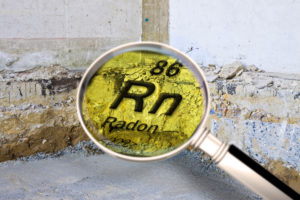What You Should Know about Radon

You do your best to make your home a healthy, safe environment for your family. You have a smoke detector, and probably a carbon monoxide detector. You may even opt for non-toxic cleaning supplies. But have you had your home tested for radon? If not, you may be putting the health of your family at risk.
- What is radon?
An extremely toxic, colorless gas, radon is derived from the naturally occurring decay of uranium, which is found in all soils. Radon can move through the ground and into your home or business through cracks and gaps in the foundation. The amount of radon that exists on your property has to do with the chemistry of your soil, and the amount that escapes the soil and gets into your building has to do with the weather, soil porosity, soil moisture, and suction. - Does it matter if radon gets into your building?
It absolutely does. Radon gas emits radioactive radiation in the form of an alpha particle. When an alpha particle interacts with a person’s DNA, it causes damage to the blueprint of the cells, and when that blueprint is damaged replicating cells can become cancerous. In fact, radon is the number one cause of lung cancer for non-smokers. Detecting radon in your home is more important than detecting carbon monoxide or smoke because radon-induced lung cancer kills more people each year than house fires and carbon monoxide combined. - How do you know if your home has radon?
The EPA recommends purchasing a radon test kit to determine whether or not your home has dangerous levels of radon. You can purchase a short-term test, which will be in your home for somewhere between 2 and 90 days, or a long-term test, which will stay in your home longer than 90 days. Typically, people purchase a short-term test, and if it comes back high, they move on to a long-term test. You can get a test online here. - What can be done about radon?
The only way to reduce radon in your home or business is through professional radon mitigation. A professional will be able to determine the best mitigation techniques for your foundation, then carry out the repairs necessary to make your home safe. Once your radon mitigation system is installed, you should test again to make sure it’s working properly.
If you’re looking for radon mitigation, Reliable Basement Services can help. A family-owned and operated company, we’ve served the greater Chicagoland area for more than ten years. We offer a full spectrum of basement services, charging reasonable rates for work that includes crack repairs, sump pump systems, basement waterproofing, basement windows, and floor repair. Our consistently high standards have made us an award-winning Chicago basement waterproofing contractor and earned us thousands of satisfied customers all over Chicago. For more information, call (630) 318-4888 or visit our website for a free quote.
